My opinion about AI art and a thought on society.
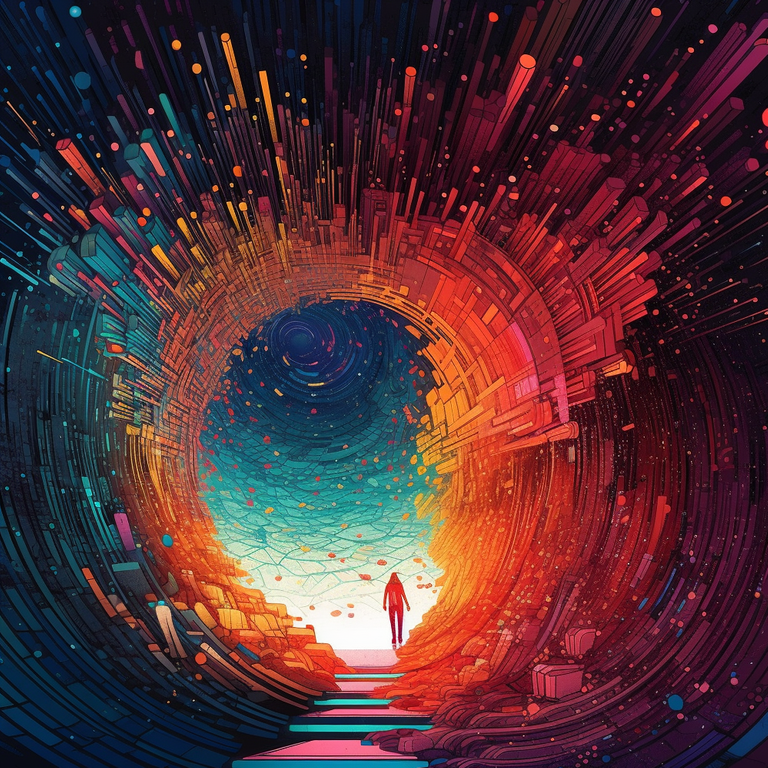
Hi everyone! 😄
I wanted to write an article today about AI. It is a subject that fascinate me, and as there are a lot of discussions about it, I wanted to give you my opinion about all this.
All the images in this article were created with Midjourney for the occasion.

What is art ?
Art seems to be a matter of intention.
A chair is industrial when it is used for sitting, but it is considered art when the person who created it intended it to be so, to seek to make it artistic.
An image generated by Midjourney is just a bunch of pixels. But it's the human who generated it who had the intention to make it artistic, to try to generate something beautiful. I think in that sense it can be considered as art.
And the discipline of this art would be based more on the skill of programming or art direction, the difficulty being to manage to direct the AI to where you want it to go.
Sometimes you have to use stratagems to get it to come out with what you want, instead of just using the first words that come along.
Art is something extremely difficult to define, as it is a concept (I'll come back to this later).
Defining what art is is more a matter of philosophy than of semantics.
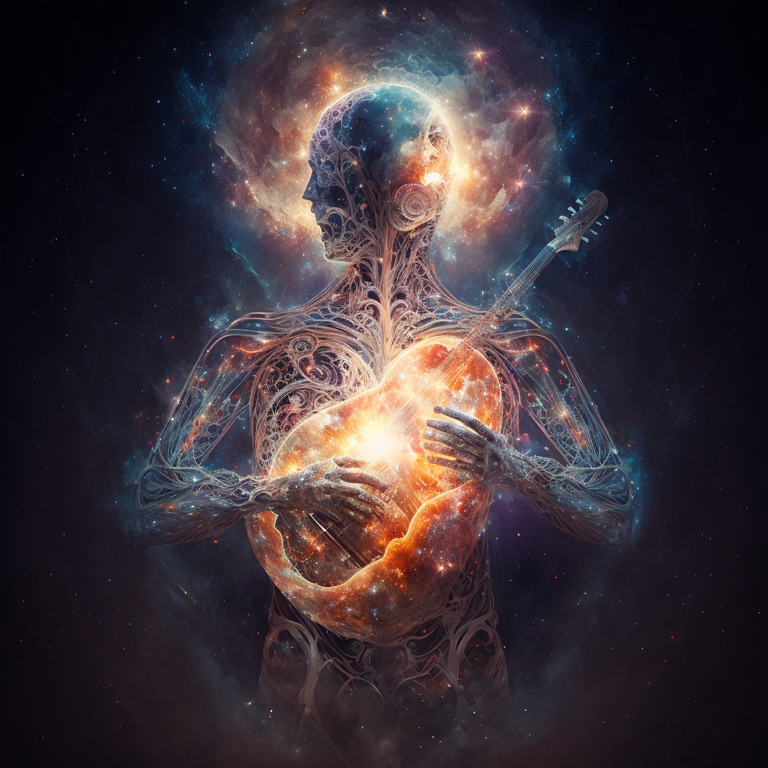
Does AI steal artists?
I could not speak about AI without mentioning the most criticized aspect about it : would it steal the work of artists?
In fact, we could not create an image starting from nothing.
It is not because you have a white paper with no reference in front of you that you start from nothing ; you will draw with all your baggage of experiences, influences and inspirations.
The first artists of history have been inspired by nature and by all the elements around them.
The next ones have been inspired by the previous artists, etc.
It is an intuitive principle, both from the point of view of the human brain and the evolution in general.
"Nothing is lost, nothing is created, everything is transformed."
AI just apply this intuitive concept. It litteraly learn from images, like the human brain.
It just make it better than us. (or sometimes less well, let's see how it draw the hands!)
It analyses billions of informations on the images, learn what makes a tree looking like a tree, what is "orange" and what is "a car", etc.
And finally, it hallucinates an new original image.
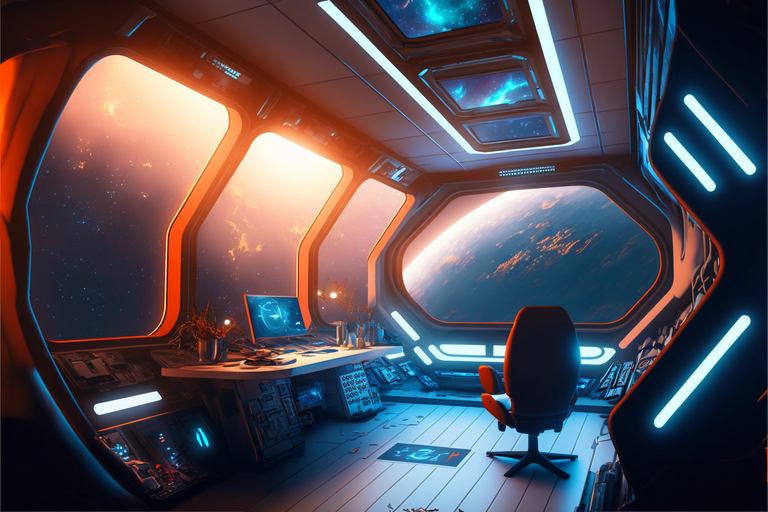
The society, not the AI
I have noticed that most of the critics of AI are about the world of work.
They are afraid of losing their jobs and also of the whole business side of AI in general.
What I think about that is that the big problem here is mostly about capitalism, the fact that people in society are mostly interested in the monetary aspect of things, more than the usefulness or simply the beauty of things.
People find themselves in direct competition with AI, so they are not let to see the potential of this technology, they just see it as an inhuman replacement.
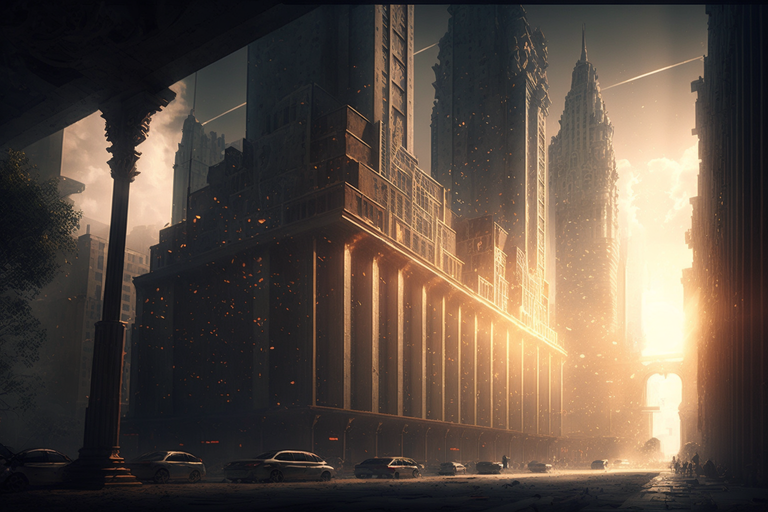
In fact, as every new revolution in sociecty (like industrial revolution) it brings movement to the trades. Some disappear, others are born, and still others are reinvented.
Maybe some technical artistic jobs will disappear, but a lot of others will emerge.
People who until now had no opportunity to share their ideas and develop their projects due to lack of artistic talent or money to pay artists will be able to bring their project to life.
I think that technical jobs as the jobs in the art area are destined to always evolve.
They depend on the technologies they use and are necessarily subject to change. It's inevitable. Learning to reinvent ourself is difficult, and it's even more painful when the world of work is toxic.
Reinvinting the concept of work
These years, we found, apart from AI, a lot of of trades in shortage due to technology, and people loosing their job. People find themselves unemployed, sometimes in misery, with the difficulty of finding a job. But this is because of the system.
In the future, it is impossible for the current "work for all" model to hold. There will be more and more of us, and there will be less and less work. And in fact, that's just as well.
I have never understood this obsession with making people work as often and as long as possible. It's exhausting, people don't have time for their own lives, and end up in burnout.
Actually, I do understand it. It's all about profitability, employing as few people as possible for as long as possible.
But, we could work less, like three people working 1/3 time each one the same work, for example.

Thanks to the technology, we could delegate repetitive work, which is really inhumane, to the robots.
It doesn't mean that their will be less humanity and social interactions, because we need them.
We're naturally drawn to sociability, and if we don't have social interaction at work, we'll have it more in places like coffee shops, or maybe there'll be a resurgence of places like Agoras, where we would discuss philosophical discussions.
The only thing is not to fall into the trap of the metaverse, which would be extremely harmful.
This is the main purpose of promoting this to the people; to put them to sleep, to have limited interactions to be as controllable as possible.
While the elite would be in control of reality.
The reign of illusion
What distinguishes us from other animal species?
The Fiction.
Other animals can interact with each other in very complex ways. But they will always communicate about physicals things, such like the banana which is next to them.
Human, for its part, can think and speak about concepts. He can fight and sometimes even to the point of losing their lives for concept such like democraty, the political left and right, patriotism,...
But all that things are not tangible. Even the starbuck coffee we drink, we do not drink it because we especially like coffee, but because we like the brand, we believe in it, in its concept.
Little by little, we have increasingly fed this imaginary world, with art having contributed enormously.
My generation is in the thick of this case of imaginary construction.
I grow with cartoons, movies, illustrated books, toys, amusement parks, video games, music,...
We are permanently in this imaginary blur, so much so that we confuse reality with it.
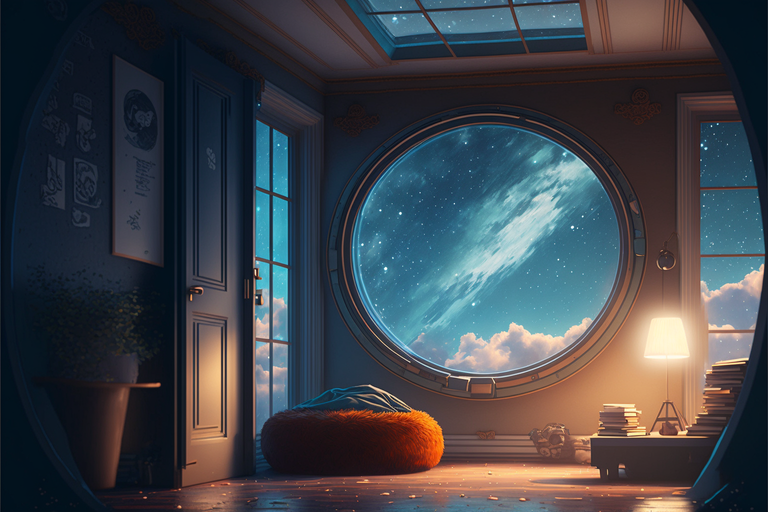
And this is exactly the fear of the people opposed to AI ; to lose even more authenticity, to live only in a virtual world.
Paradoxically, while I totally denounce the unreal aspect of society, it is not something I fear in relation to AI.
In fact, I'm quite fond of the "straw that broke the camel's back" concept. In politics or sociology, I think it's when humans tend towards an extreme that it comes out.
Now, we are so overwhelmed by the unreal, the fictional, the synthetical that people will get tired of it all, and will want to get back to basics. They will have been disgusted with the overload and will want to experience back the stimuli of reality, to see and experience real things.
An example I can give for to support my point is the case of vinyl; today there is a resurgence of listening to music on vinyl, instead of CDs. People have been so used to digital that they want to go back to something more authentic, more tangible.
History is an eternal restart
The actual discussion about AI makes me think about previous ones such like the transition of the photography ; at this period, painters was very critical about photography, and thought that their profession would die out, because anyone could now have his or her photograph, and would no longer have to request a painted portrait.
I'm sure that at this time, a lot of people criticized photography, saying that it was not art, as the photographer having "only" captured reality.

But the fact is that 2 century after, there are always photographers, and there are always painters.
After the apparition of photography, the painters reinvented themselves. As the photographers have seized on the realistic side of the image, painters started to search about less realistic form of expressivity, such like impressionnism.
I'm sure that it will be the same for AI.
In the future, they will always be both AI and artists.
But in what form ?
The technology given to the elite VS technology given to the people
In fact, I am mostly very reluctant to new technologies, because most of them are taken by elites. I am very afraid of surveillance technologies, which would bring us closer to an Orwellian world.
What happened in China reminds me a lot of that, and it is very worrying for the future.

But when technology is given to the people, it is a big power.
The AI revolution makes me think about the internet revolution.
This is an example of a technology open to the people, which makes them freer and stronger (as long as you use it well, as with everything).
We can be aware of things that should not have been known, learn things by ourselfs. Communicate with people very far away.
The elites know that the internet is a threat, which is why they try to restrict it, or limit thought through social networks.
Jaques Attali, an important French man, in fact said :
"The Internet represents a threat to those who know and decide. Because it gives access to knowledge other than through the hierarchical process."
The prevailing intellectual laziness
An other point to mention, when we talk about the potential drift of AI in society, is the intellectual laziness, a phenomenon with which we are already very familiar.
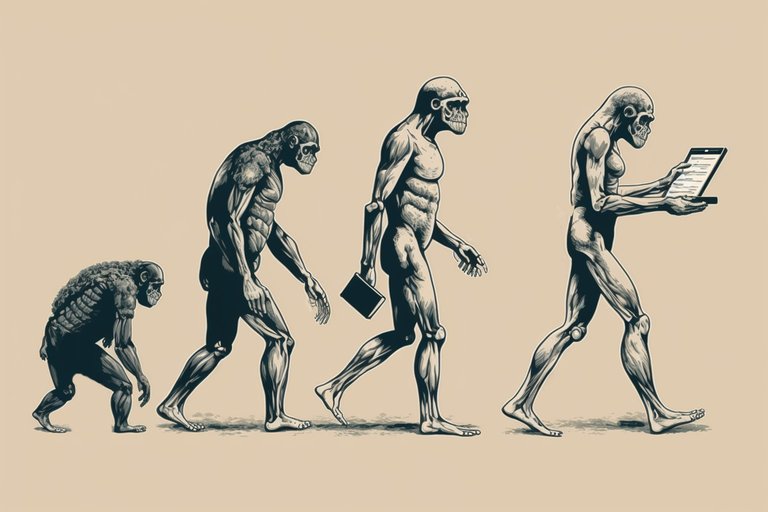
Accustomed to the facilities offered by everyday technology, we make less and less effort.
If we only use AI to create content on the assembly line without having to think, yes, it would suck.
But, if we use it as a tool to gain time to focus on most important things, or use it to build a project, find inspiration for painting,... then, AI would be a great support.
Again, technology should help us to improve reality, not substitute it.
It should elevate us, make us more intelligent, rather than dumbing us down.
It should help us save time to focus on the essentials, not waste it by being dependent.

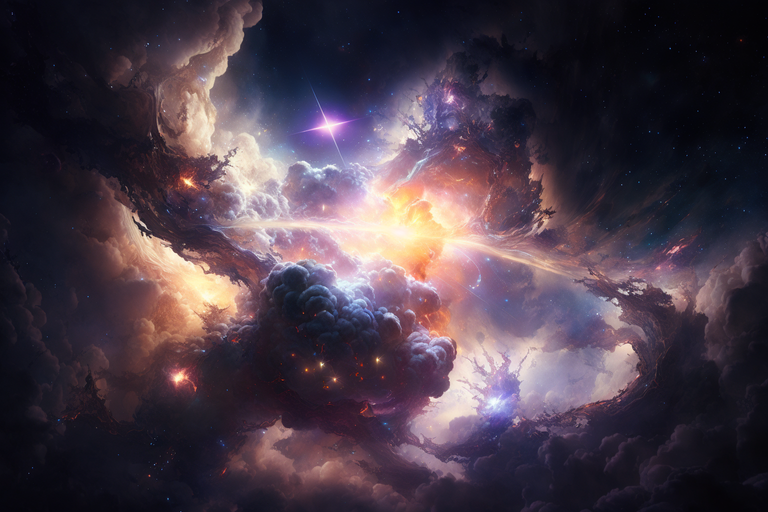
In conclusion, I would say that : tools given to the people are a strenght.
It is to us to appropriate them et makes them our allies, to push us beyond our limits.
I would like to discuss more about AI, especially about the use that we could have with, but I didn't want to spread myself too thin in this article, I preferred to concentrate on the sociological aspect of the subject.
So, the next article about AI will talk about its possibilities, some examples of uses that can be made of it.
Thanks for having reading me.
Don't hesitate to leave a comment with your opinion, I will be happy to exchange with you, whatever your opinion, it is welcome.
Have a nice day and see you soon! 😊
I'm so glad I clicked on your post. I'm so sad that I'm so far, the only one to come and want to leave a comment.
Your post gave me some serious flashbacks to reading the work of Roland Barthes and Baudrilard.
Art, just like matter, is made up of tiny portions of everything else that came before it. I love this eloquent viewpoint you've put together, it explains it better than I ever could.
We're just seeing the democratisation of Art at this period of history. Just as Paul Delaroche, upon the invention of photography said that "painting was dead", his works still hang in galleries and are still valued for his skill and the stories he depicted.
Finally you were not the only one ehe :)
I'm glad you liked my thesis. I've not read Baudrilard yet but but it is planned:)
You're right for the democratisation and it is an important point.
I've seen a lot of people critizing AI art in a way that it seemed like they were more defending their status in the field than a real debate about the art itself.
Thanks for your comment and have a nice day :)
Unlike the dramatic statements of Paul Delaroche on the invention of photography:
His work still sits in galleries and is still considered masterful today.
Absolutely !
The "democratisation of Art" is code for I want the praise and rewards others receive for their years of hard work and discipline, but not put in the same effort to achieve it.
Claiming the "democratisation of Art" is the same as claiming to be a great sprinter like Usain Bolt, but you cross the finish line as a passenger in Ferrari.
We do not taunt the painter or the illustrator for not manufacturing their own brushes or pencils. We don't taunt a photographer for not manufacturing their own lenses and camera sensors.
Upon the invention of photography, Paul Delaroche said that painting was dead. It is far from dead. His work still sits in galleries because it has narrative strength.
The elements of representation can be learned, as can draughtsmanship, and it is a constant improvement process for the lifelong student. I'd love to resurrect a few cultural theorists like Walter Benjamin or Roland Barthes and ask them what they think of generative art.
As a trained artist myself, it is easy to see the shallow-depth of a generated image. While there is symbolism, composition, lighting, and other elements of art on display; it remains rather unsophisticated if exposed to any serious critique.
As a result, generated art is of a lesser quality, but much like the scores of people that produce derivative, unsophisticated work which doesn't contribute to the history of representation in any meaningful way, generated art and AI allows these people on the fringes to explore some level of creativity.
It is a tool. A gun can be used to cull a wild beast, or to kill another man. A hammer can be used to drive a nail, or kill a man. If Visual Art is about intention and representation; then is not the use of a tool, much like a brush, camera, kiln, pencil or pen, that delivers us that outcome?
The tool is not the artwork, nor the artist, nor the outcome.
What makes the artist is the mastery of the technique, tools, materials and self.
The value of the outcome (artwork) is dependent upon the creator and the process.
A hand crafted item is worth far more than that of an automated product.
AI "art" is just that, automated product and not worthy of the title art. It is disposable like anything available from a vending machine.
This is a very insightful post. Thank you. Personally, AI doesn't bother me, because whatever artisitic endeavours I'm undertaking, I'm doing it for me and not for the world. Not for monetary gain, and not for the admiration of my peers. So I'm at peace with myself, because I know what it took to accomplish whatever I have pursued.
This is a major problem, especially since the lazy people then proceed to want credit / status / money / influence for their technology-dependent underachievements - and in that sense it bugs the sh.t out of me! It goes against everything I consider fair and just. Like every human endeavour, art requires the learning of craft. AI and other smart tools make it possible to skip the arduous task of acquiring the craft and go straight to the result. You want me to admire that? I don't think so!
Consider this: If the world ends tomorrow and all the plugs are pulled, you and I gather at a campfire. We find some flat rocks, pick up a few pieces of charcoal, and we will still create nice art. Why? How? Because we bothered to learn the craft required.
I'm also a hobby musician, and I love my Yamaha digital piano! I have played (and learned) for many years. My DP has arranger functions, and I can create a reasonable facsimile of a jazz big band performance with only two hands. However, take the fancy digital tool away, give me a pocket knife and a stick of pussy willow, and I will make a flute to create more beautiful music than the lazy SOB who passes for a star DJ. (Yeah, that bugs me, too: Non-musician DJs who are celebrated for mixing up real musicians' audio loops.)
So, yeah, all this AI stuff is well and good, as long as it's done for fun or to speed up industrial processes. Sell it off as a personal accomplishment for whatever gain, and I have nothing but contempt for you.
Yes you totally right. It would be nice if people thought like you, and stop to search acknowledgement for itself without efforts. It makes me think about tiktok "stars" and a lot of young people that just want to be famous, for being famous, but without doing nothing. It is so unhealty !
Yes, like you said, real artists can makes art
as much with simple equipment as with the most sophisticated because they are passionnate by art and by the feeling when doing that.
Thanks for your comment, have a nice day :)
You have pointed out the obvious in a very elaborated way. A knife can be a valuable tool or a lethal weapon depending on the way we use it. But the bottom line of this discussion is political.
Capitalism or the elites or whatever we want to call the psychopaths that rule this world will never allow it. When the people are too many, they will gladly make a world war and calculate their profits from it. So although I agree with your thoughts, I don't share your optimism.
Indeed
and that's why they will never be given. And I don't see people willing to fight for it. On the contrary I feel that the Orwellian dystopia is coming faster than we think and no-one is resisting.
I really hope that I am wrong on this one!
I'm not always optimistic, it's true that the current world can make us as pessimistic as possible. But I allow myself to dream of better, sometimes :)
Meeting people who are aware of the problem is already a big step. In this sense, reading your comment inspires me something positive, whereas it was rather negative at first (or maybe I have a masochistic side :D) because you right, a lot of people don't want to fight for that because they don't see the problem. They think this is the normal course of democracy lol.
Something you have to keep in mind is that digital tools are subject to programming - something fabulous that common people can acquire, but few of the elite have mastered. This is how the authorities and the powers that be are always one step behind the hackers.
Regarding AI, at first it was going to become a monopoly but finally resourceful people managed to compile leaked facebook AI databases to allow everyone to use it on their personal computer.
Thanks for your comment, have a nice day :)
Now it is my turn to get inspired with something positive, from your reply :)
We belong to different generations, mine has already fought (and lost) most of its battles, yours is just beginning and it very comforting to meet young people with clear mind and good judgement! Plus that although I write here, in a decentralised blockchain and ecosystem, I am not that familiar with digital technology, so I'll take your word that people could eventually master it and make it work for the common good.
Cheers!
I am a digital artist, my style is similar to the fantasy themes often mimicked by AI
I think it can become a tool for artists who actually know how to weave something unique and of their own, but right now people are claiming to be artists by the power of a click and I don't think that's entirely ethical, as it wasn't ethical it was fed millions of pictures of artists without their permission. If you create in the style of, and you know the art of that person, it regurgitates and almost but no quiet copy, maybe not a pixel per pixel but enough to be an obvious copycat. I'm against AI, no, you cannot stop progress, but it cannot be a free bar at the expense of creators, and its misuse by people to claim to have done manually what they haven't and so. Magazines are now flooded with short stories written by AI claiming to be humanly written and they had to close submissions due to the overwhelm.
Technology and progress is here and cannot be stopped, I'm not saying I'm entirely against its use, but the tools right now also provide ways of misuse and in order to move forward we need to stablish some rules.
Now there are software that can steal your likeness, softwares that even can still your voices, your style, your idiosyncrasy
and these very basic things needs to be addressed or it will carry a stain
I'm in entirely for people creating elements for their compositions, or to create video backgrounds and weave and create art out of it, but people selling a print of an AI claiming they're all of a sudden artists, that is NOT ethical. I've faced even now comments, like bad AI, for drawings taht have been published since 2011, do we digital artists need to validate now we actually put our hours in? How are we going to be paid a fair share for our time if an AI can generate a "similar if not quite the same" work in a minute.
So it's a double edged sword, it is and will become a tool
but we also need to sit down and triage the rights and wrongs of its practise which will be detrimental for all creators.
No one should post a picture made by AI and pretend that it was created by him - it's stupid and unfair. I don't even understand the point of such behaviour, he gains nothing for his personal esteem since he didn't really do anything.
But, it's probably for the money, like many things, money makes you stupid.
And I agree with you when you say that they shouldn't call themselves artists just for writing a prompt.
But I think you're wrong when you say that it's unethical for AI to have fed on the work of artists. In fact it is the principle of every artist to be inspired by the work of others.
Everyone has an artistic background from somewhere else, allowing them to do what they do. You wouldn't have the style you have if you hadn't seen the work of this or that artist before. That doesn't mean that you copy or plagiarise what he does.
The AI makes millions of attempts, it can produce a plagiarized image, as we can do inadvertently (sometimes we have the same original idea as someone else, and then good luck proving that you didn't do it on purpose...).
And I think in that case it's the user's responsibility to make sure it's not before sharing the image. (there are plenty of search engines for this, just Google for similar images)
Searching for an image similar to an artist's style can be very interesting for research, and combining it with other styles can create a new one, but it is clear that simply looking to copy an artist's style and using the resulting images as such is quite unfair to the artist in question.
Unfortunately, works such like digital artists are subject to the laws of the market, and that's why I discussed that we should change the labour system - but as it is, jobs move, sometimes this or that job is not profitable anymore.
Digital jobs are bound to be unstable, because they rely on the technology they use.
Moreover, digital artists have themselves taken a share of the market from traditional artists, who produced creations much more slowly, and with fewer resources.
Thanks for your comment, have a nice day :)
I am currently practicing to become an artist myself, and I gotta say, one of the best things I think about being an artist is that you could look at an amazing piece of artwork you created and get this incredibly rewarding feeling of satisfaction knowing that it took you years of practice and learning in order for you to create said artwork. That's a feeling "AI Artists" will never experience.
Of course I know exactly what you mentionned and you right.
But, as I consider the produced images by AI as a kind of art, it would clearly be pompous to claim to be an artist because we only have released an image with MidJourney.
But again, it is not a specificity about AI, it goes back to what I was saying about intellectual laziness - some people want a result without efforts, and claim to be artists just because they have drawn a line on a sheet of paper (sometimes even without any line).
But again, this is a matter of opinion. If defining what is art is difficult, defining what makes an artist is even more difficult.
Because there is a kind of legitimacy to acquire, to be recognised as such by one's own people.
But you presume that the AI produces a finished image and that the person using it will stop there. In fact, in most cases, it's just the beginning of the work.
The AI will have done its part, and then the person will make it their own, do a photomontage, recreate their own image, or be inspired to create another, making them an artist in the most common sense.
What finally differentiates the use of images by AI from the use of photos in the creative process?
If only the possibility of having a better search engine, and images that can be used freely for our creations?
Have a nice day, thanks for having left a comment :)
Sorry to say, this is precisely what is happening, because most people want quick and easy, not a long journey of commitment and discipline. It is worse than pompous, it is fraudulent.
I see art platforms being flooded with AI images, and attempting to sell them as their own, even targeting specific artists and their styles.
It is the exception not the rule.
I see the tide of wannabe AI "artists" making groups where they can share in the group mind think and self congratulate themselves on the effortless images that an algorithm generates for them, and claim it as their own. Of course everyone in these groups thinks the same and so the circle jerk continues, reinforcing the self-delusion.
Agreed! Art is not just the end "product". For more traditional forms of art, it requires self-discipline and mastery of the technique, materials and most importantly, of oneself.
AI "artists" never have to go through this and will never achieve any level of mastery.
Ah, all the usual excuses:
Some calls it art, so it must be art, well people have put turds in tins and called that art also
Discipline or skill of "programming" the AI? Art direction? Come on, what have you been smoking? Typing a few words on prompt does not make you a programmer nor an art director, just a prompt monkey.
Does AI steal from artists? Yes. "Nothing is lost, nothing is created, everything is transformed." Tell that to the artists that have had their copyright violated. There are some big law suites already underway.
Ah, the old, anti-AI people are just afraid of change. Adapt or die. Or when feeling a bit more charitable, people worried about other technological changes taking away their jobs changing their world, and they survived.
No they did not! Any student of history will tell you that a disruptive technology such as the printing press created massive societal upheaval, chaos and war.
"inhuman replacement", yes, good luck with reasoning with or imploring for the humanity of your next automated AI chat assistant.
Ah, dirty money grubbing capitalist artist pigs, demanding to be paid for their skills that they took years to develop.
If you let a "lack of artistic talent or money" stop you from bringing your project to life, then not even AI can help you.
AI is not a magic genie that snaps it fingers and POOF!!! instant success.
Ha ha, the concept that some people actually love what they do for work never enters your mind. For these people, it never has been work, but a passion.
If you can't find engagement, meaning and passion in any work now, do you honestly think you'll discover it if you "don't have to work"? This problem exists in you before you even accept a job, because, if you truly were an inspired and passionate person, you'd already doing these things, and let nothing and no one stand in your way.
Will you? You may have used up all of your carbon credits and cannot purchase another coffee until next month, because you are now living from Universal Basic Income. Those philosophical discussions are banned, and will give you a negative social credit score, so your UBI will have the fines automatically debited.
Something I agree with.
But when people used AI instead of learning an authentic skill to produce tangible culture, there is no "going back" for them.
Any student of history will tell you that knowledge, culture, skills and technology can be lost if the chain of learning is broken, abandoned or destroyed.
What happens when the power goes out? No AI to think for you then.
Correct! AI is a fad. Enjoy it while it's hot. In the near future you will be still stuck with the reality that you haven't practised or developed any skills.
The painters and photographers own their skills and equipment with which they make their creations.
With AI, you own neither, and those that control the AI can take it away from you any time they want.
Ha ha, how are you going to change that? You don't own or control the AI technology. Those that do, control you. Period. Whining about fair societies isn't going to change that. AI is only going to accelerate the tyranny.
Already happening.